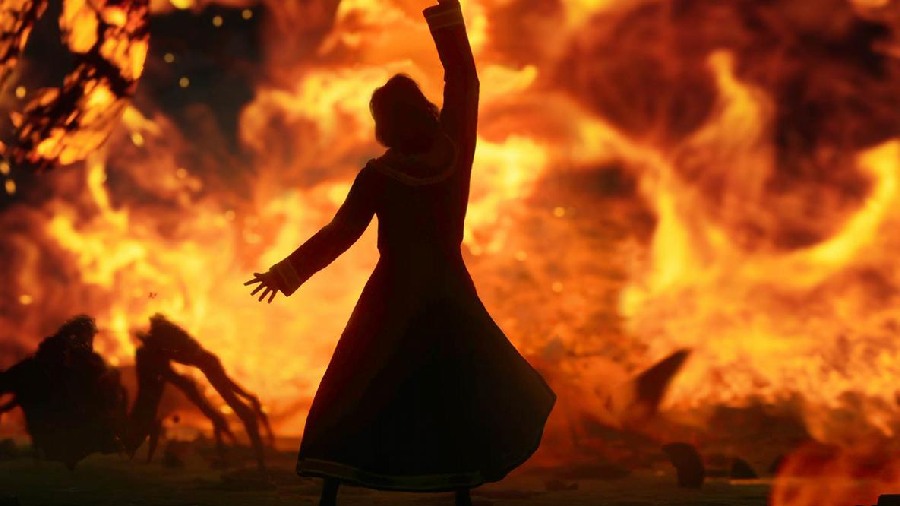Gamers, especially those who are also fans of the Wizarding World of Harry Potter, have been looking forward to this day for several years: the release of the long-awaited "Hogwarts Legacy" immersive, open-world role-playing game.
Set in the late 1800s, it provides players with the virtual experience of attending a wizarding school, including riding brooms, mixing potions, and casting spells. It's the latest spin-off item in the franchise launched by the mega-selling "Harry Potter" books written by J. K. Rowling.
Guilt by association?
But this release has been accompanied by controversy, primarily due to its indirect association with J. K. Rowling, who in recent years has made negative headlines by taking a stance that has set her against transgender rights activists.
What started in 2018 with her "liking" a tweet describing trans women as nothing more than "men in dresses," a move her team dismissed as a "middle-aged moment" caused by a slip of the thumb, has developed into the millionaire writer digging her heels hard into the anti-trans ideology, which she has expressed in tweets, blog posts, and her non-Harry Potter novels.
Long lauded for her philanthropy, Rowling has meanwhile funded a women's center that specifically bars trans women.
Most recently, the writer has railed against Scottish First Minister Nicola Sturgeon for supporting a self-identification law that would make it easier for transgender people to change their gender markers.
Against that backdrop, it seems inevitable that there have been calls for a boycott of "Hogwarts Legacy," which have been hotly debated online.
Rowling herself has called out one of those supporting a boycott, a trans gamer named Jessie Earl, accusing her of "purethink" and equating a boycott to burning books and libraries. (Though no definition of the term "purethink" can be found on the internet, Rowling is presumably referring to an intolerant ideology that would not allow any other opinion to exist.)
The debate has become so heated that one gaming forum has banned any discussion of the game whatsoever.
How effective is a boycott?
Yet there are those gamers, even within the trans community, who question the effectiveness of such a boycott, and assert that "ethical consumption" is impossible within the framework of global capitalism.
Some have said they would try to buy the game second-hand, or even acquire a pirated copy. And still others have argued for separating the creator from their creation, and that the importance the Harry Potter Wizarding World has had for the childhoods of so many people lends it a meaning that has grown beyond what Rowling has intended.
But can the publicly expressed views of this creator of a fantasy world be fully separated from the context of real-world harm being done to an already marginalized group?
In the US, some state legislators are introducing ever more laws aimed at curtailing the rights of transgender people. And anti-trans sentiment in the UK has caused a political rift between Scotland and England. Trans people, especially trans women of color, continue to be the targets of often deadly violence.
Developer attempts to distance itself from author
The games developer, Portkey Games, has been careful to point out that although "Hogwarts Legacy" is an officially licensed game, J. K. Rowling herself was not involved in developing the story in the game. Still, she will have received money from licensing her intellectual property to the developers.
Portkey also appears to be further distancing itself from Rowling by adding the franchise's first transgender character, Sirona Ryan. The game also allows players to create a transgender character with the customization options.
Accusations of antisemitism
But it isn't just Rowling's controversial stance against transgender people that has sparked criticism of the game.
The "Harry Potter" books and films have been accused of perpetuating antisemitic stereotypes with the characters of the goblins, who are portrayed as a secretive group of hook-nosed bankers.
And in this game, one of the tasks is to battle those figures, who are staging a "Goblin rebellion," in protest at their lack of rights, which includes their being banned from using their own magical skills.
Portkey itself has come under fire during the creation of the game, with senior producer Troy Leavitt criticized for a YouTube channel featuring anti-feminist and misogynistic videos. That employee has since resigned.
Any or all of those factors may well lead some gamers to choose not to buy "Hogwarts Legacy."
But it's clear that the boycott efforts have failed. Even ahead of its launch, "Hogwarts Legacy" is already the best-selling game on several platforms.
The Harry Potter Wizarding World remains hugely successful, and many people who grew up with it remain intensely emotionally connected to it — even if they also belong to marginalized groups who stand to suffer from anti-transgender views.











